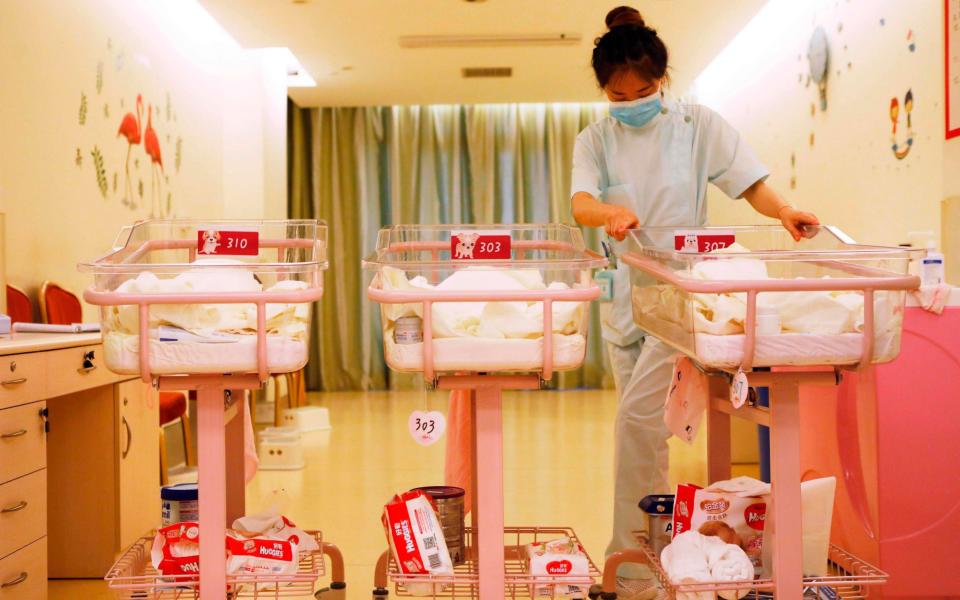China's birthrate falls to lowest level under Communism despite push for more babies

China’s birth rate fell to its lowest last year since the Communist Party took power 70 years ago, exacerbating concerns that population challenges will drag growth in the world’s second-largest economy.
Despite abolishing the one-child policy, the country posted 10.48 births per thousand people last year, the lowest since 1949, according to China’s national bureau of statistics. That amounted to 580,000 fewer babies in 2019, compared to the previous year.
China is battling a shrinking labour force, squeezed on both ends by a fast-aging population and waning births, a trajectory that will impact growth at a time the economy is already suffering. On Friday, China posted annual GDP growth of 6.1 per cent, the lowest rate in three decades.
The country’s working-age population has been on the decline since 2012, and is expected to fall roughly 23 per cent by 2050, according to official data.
To mitigate the demographics challenge, Chinese authorities abolished the controversial “one-child” policy in 2015, allowing couples to have two children.

The policy, imposed in the late 1970s, was originally aimed at combating concerns about whether the economy could support a rapidly-growing population. Implementation was brutal, with forced abortions and high fines for families that dared to have more babies.
But many experts hailed the end of the policy as too little, too late.
These days, even though Chinese couples can have more children, many are choosing to wait to have them, if they procreate at all, given an increased cost of living.
Divorce rates are also climbing as cultural stigma around separation diminishes – last year, about three million couples filed for divorce, while seven million tied the knot, according to official data. Some women, like their Western counterparts, are choosing to stay single.
China remains the world’s most populous nation with 1.4 billion, and authorities are also grappling with how best to provide health care and pension payouts as more people enter their golden years.
The burising trade war with the US has led to China's posting it's weakest levels of growth in nearly 30 years.
New data on Friday also showed how the world's second-largest economy slowed to 6.1 per cent, from 6.6 per cent in 2018. Though still strong by global standards, and within the government's target range, it was the weakest expansion since 1990.
This year is crucial for the ruling Communist Party to fulfill its goal of doubling gross domestic product (GDP) and incomes in the decade to 2020, and turning China into a "moderately prosperous" nation.
Analysts reckon that long-term target would need growth this year to remain around 6 per cent, though top officials have warned the economy may face even greater pressure than in 2019.
More recent data, along with optimism over a Phase 1 US-China trade deal signed on Wednesday, have raised hopes that the economy may be bottoming out.
Infrastructure investment grew just 3.8 per cent in 2019, decelerating from 4 per cent in January-November, despite sharply higher local government bond issuance and other policy measures.
The slowing economy could spell trouble for the Communist Party's pledge to eliminate extreme poverty in 2020.
Concerns about poverty re-emerged this week when a student who went viral on Cihnese social media for because she was too poor to afford adequate food died in hospital of malnutrition.
Wu Huayan, 24, was 135 centimeters tall (4.4ft) and weighed just 21.6 kilograms (3.5 stone). She was living with her younger brother, surviving on a social security program allowance of 300 yuan ($43.50) per month, according to the government statement.
The 24-year-old reportedly spent just two yuan ($0.29) per day on food - such as rice mixed with chili peppers - in order to pay for her younger brother's medical treatment.
Wu's death has sparked outrage among Chinese social media users.By Wednesday, a video about Wu's malnutrition and death had garnered more than five million views.

